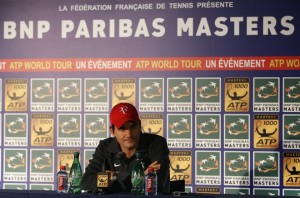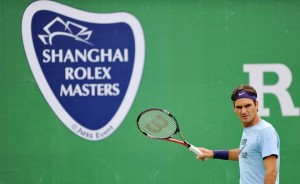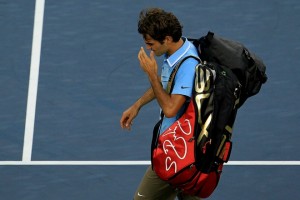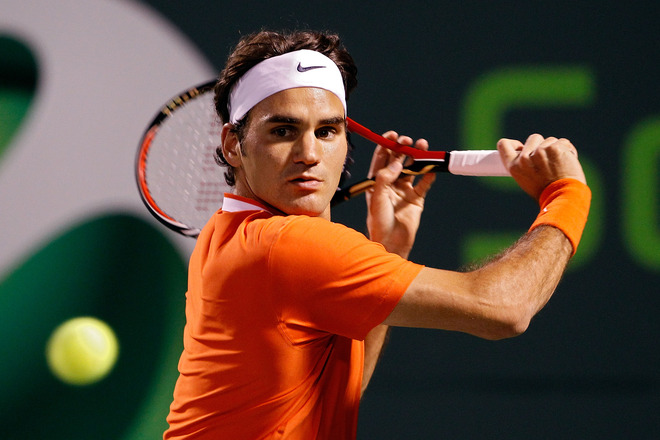It seems improbable that Roger Federer, the man who has won more Grand Slam singles titles than any other man, was once labeled a “Grand Slam loser.” But that was the case back at Roland Garros in 2003 – when he was humiliated in a first-round loss. The following excerpt from Rene Stauffer’s book ROGER FEDERER: QUEST FOR PERFECTION ($19.95 New Chapter Press, www.RogerFedererBook.com) summarizes the valley in the career of Federer from the French Open in 2003, the major before his big break-through at Wimbledon.
***
Federer’s success continued into the start of the clay court season as he won the title in Munich and also reached the final of the Italian Open, losing unexpectedly to Felix Mantilla of Spain. The result, however, still propelled him into the conversation as being a favorite to win the French Open. “I feel much better this year than the year before when I first was in the top 10,” he explained in one of the many interviews before the French Open. “It was a new situation for me back then. I’ve gotten used to it in the meantime.”
He admitted to feeling the pressure from the public. “The entire world keeps reminding me that I am supposed to win a Grand Slam tournament and be No. 1 in the world. That’s not fair because it’s not that easy,” he said. He then stated defiantly that “whoever wants to beat me will have to work hard for it. I don’t want to lose in the first round at Roland Garros again.”
On a summery Monday afternoon in Paris, Federer’s first match at the 2003 French Open took place on Court Philippe Chatrier, the center court named after the Frenchman who was a past president of the International Tennis Federation. His opponent was an unknown Peruvian Luis Horna, whom Federer beat earlier in the year in Key Biscayne. Horna, ranked No. 88 in the world, had yet to win a match at a Grand Slam tournament. Federer took an early 5-3 lead in the first set, but began to show his insecurity and nerves when, during a routine rush to the net, he slipped and fell to the ground, only to mutter to himself and show negative emotions. Despite his lead, he seemed discouraged and, quite unusually, often glanced desperately at Peter Lundgren. Federer lost his service break advantage and despite holding a set point in the tie-break, he surrendered the first set by an 8-6 tie-break. The match immediately turned into a drama for Federer. He seemed frustrated, apathetic and didn’t show any belief that he could win. He appeared mentally absent, missing even the easiest shots. He tallied 82 unforced errors in the 7-6 (6), 6-2, 7-6 (3) first-round loss.
The tournament was shockingly finished before it even really began. Federer, the fallen favorite, appeared in the overcrowded interview room with his head bowed low. “I don’t know how long I’ll need to get over this defeat,” he said. “A day, a week, a year—or my entire career.”
Federer became the ridicule of the tournament. France’s sports newspaper L’Equipe ran a headline the next day translated as, “Shipwrecked In Quiet Waters” and published a cartoon in which a steam ship named “Roland Garros” steams away, leaving Federer behind in quiet waters. Florida’s Palm Beach Post described him as the “Phil Mickelson of Tennis,” comparing Federer to the American golfer who failed to win any of the major tournaments despite his great talent and many opportunities. “Federer has all the strokes but no Grand Slam trophy. He carries the dog tags of the best tennis player who has never won a major competition.”
The loss undeniably confirmed Federer’s reputation as a Grand Slam loser. He showed that he was a player who could not pull out a match even though he was not playing his best tennis—a characteristic that most champion tennis players exhibited, most notably in the present by Lleyton Hewitt, who could win a match on guts and determination alone. Since his victory over Sampras at Wimbledon in 2001, Federer was 0-4 in matches at the French Open and Wimbledon—the last three matches without even winning a set. His last five Grand Slam tournaments ended in defeat at the hands of much lower-ranked players
What could one say in his defense? Federer was now five years into his ATP career and approached his 22nd birthday. He won six ATP singles titles, excelled in Davis Cup play and time and again insisted he was capable of achieving greatness. He was considered one of the bigger stars in tennis and climbed to No. 5 in the world rankings. But outside of the title in Hamburg, all of the tournaments he won were smaller events and even the German Open was not a Grand Slam tournament. Federer failed routinely in the arenas where it was decided if a player was a champion or not. The once precocious maverick simply could not bring his tremendous potential to bear at the Grand Slams. When looking at the successes of his idols, rivals or earlier great players, he couldn’t help but feel envy. At his age, Becker, Borg, Courier, Edberg and Sampras as well as Hewitt, Safin and many others had already long since won their first Grand Slam titles. Federer, however, had not even reached the semifinals at a Grand Slam tournament. The experts were unanimous in their opinions that Federer was mature enough athletically to break through a win his first title. But athletic brilliance alone was not sufficient enough and Federer was still searching for the key to real success. An analysis would seem to indicate that a mental block was preventing him from winning. He felt under pressure to such a degree at the Grand Slam tournaments that he couldn’t concentrate on the moment, especially in the early rounds. This was a basic rule for success. The pressure came from all sides—but mostly from himself. He hadn’t yet learned that these tournaments couldn’t be won in the first week but they certainly could be lost. With some luck, he could have already won a Grand Slam title—in 2001, for example, after upsetting Sampras. Everything would have looked different.
After his loss to Horna, Federer seemed to be the loneliest man in tennis. He was a man alone braving the stormy tempest. How could he have known that this defeat was to be his last such one-sided Grand Slam defeat in a very, very long time? How could he have known that this painful experience was necessary in order to become the hardened, keen-sighted but yet modest champion who would have the tennis world at his feet?
Federer described what really happened when he faced Horna in Paris months later. “I was simply not prepared mentally,” he said. “I put myself under too much pressure. After losing the first set, I couldn’t get back into the match. I had the feeling that it was impossible, that I was no longer in control of the situation. After the first set, I said to myself, ‘Even if I survive this round, I still have to play six more rounds to win this tournament.’ That almost drove me insane. I put myself under such pressure that I couldn’t play anymore.”
After the match, he said that he was overwhelmed with questions about the how and why. “But at that moment, I didn’t really feel like talking about it. I was too disappointed. I wanted to do nothing else but take eight days vacation and then start my preparations for the grass tournament in Halle. I didn’t want to think about Roland Garros—I wanted to forget it. I didn’t want to analyze what happened because I knew that I had simply failed mentally. I didn’t accept it by any means.”





